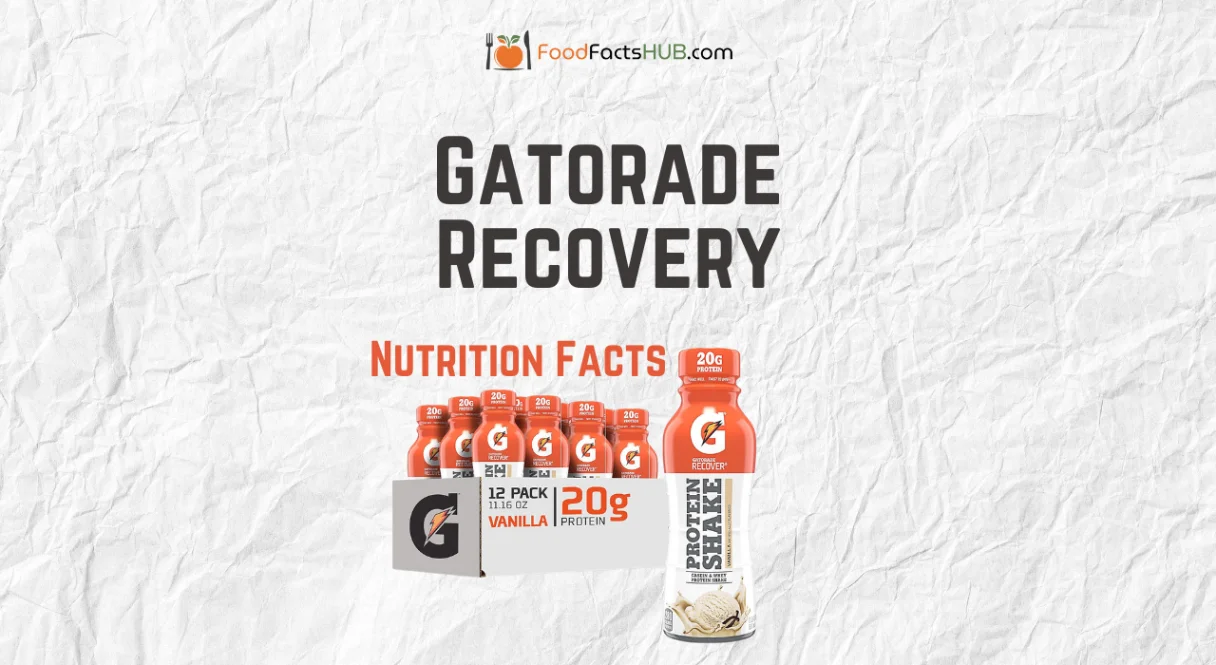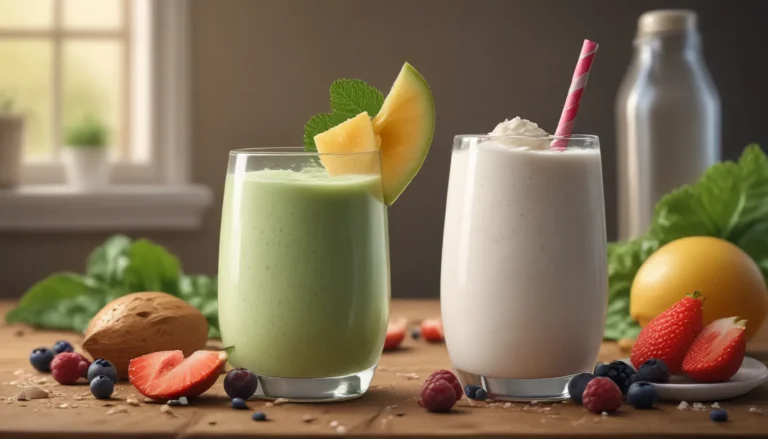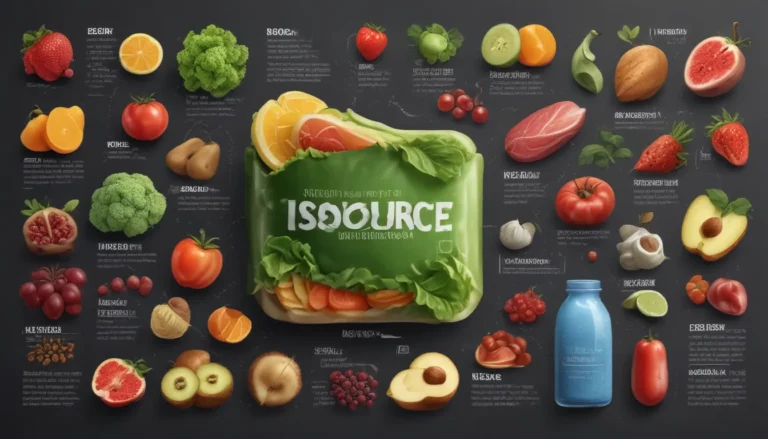The pictures in our articles might not always show exactly what the text is talking about. We use these images to make the article more interesting and eye-catching. They are there to add to the text, but not to replace it or show every detail.
Introduction
When it comes to sports nutrition, Gatorade has been a household name for decades. Known primarily for their hydration products, Gatorade has expanded its lineup to include a range of recovery options designed to help athletes bounce back after intense physical activity. In this article, we'll dive deep into the Gatorade Recovery nutrition facts, exploring how these products can support your post-workout needs and overall athletic performance.
The world of sports recovery nutrition is constantly evolving, and Gatorade has positioned itself at the forefront of this movement. By understanding the nutrition facts of Gatorade Recovery products, athletes and fitness enthusiasts can make informed decisions about incorporating these supplements into their regimen. Whether you're a professional athlete or a weekend warrior, knowing what goes into your body after a grueling workout can make all the difference in your recovery and future performance.
Key Takeaways
- Gatorade Recovery products are specifically formulated for post-workout nutrition
- These products typically contain a balance of proteins, carbohydrates, and electrolytes
- The nutrition facts vary between different Gatorade Recovery product lines
- Proper use of recovery products can aid in muscle repair and glycogen replenishment
- Gatorade Recovery options cater to different athletic needs and preferences
Nutrition Table: Gatorade Recovery Protein Shake
| Nutrient | Amount per serving |
|---|---|
| Calories | 270 |
| Total Fat | 1.5g |
| Carbohydrates | 45g |
| Protein | 20g |
| Sodium | 230mg |
| Potassium | 180mg |
| Calcium | 500mg |
| Magnesium | 70mg |
Note: Values are approximate and may vary slightly between flavors.
Understanding Gatorade Recovery Products
Gatorade Recovery products are designed to address the specific nutritional needs of athletes after strenuous exercise. The main goal of these products is to replenish energy stores, repair muscle tissue, and restore electrolyte balance. Let's break down the key components of Gatorade Recovery nutrition:
1. Protein Content
One of the most crucial elements in Gatorade Recovery nutrition facts is the protein content. Most Gatorade Recovery products contain around 20 grams of high-quality protein per serving. This protein is essential for:
- Repairing muscle tissue damaged during exercise
- Supporting muscle growth and adaptation
- Enhancing overall recovery
2. Carbohydrate Profile
Carbohydrates are another vital component of Gatorade Recovery products. The nutrition facts typically show a significant amount of carbs, often in the range of 40-50 grams per serving. These carbohydrates serve several purposes:
- Replenishing glycogen stores depleted during exercise
- Providing quick energy for tired muscles
- Supporting the uptake of protein for muscle recovery
3. Electrolyte Balance
True to Gatorade's roots in hydration, their recovery products also contain a balanced mix of electrolytes. The Gatorade Recovery nutrition facts usually highlight key electrolytes such as:
- Sodium
- Potassium
- Calcium
- Magnesium
These electrolytes help restore what's lost through sweat and support proper hydration and muscle function.
Types of Gatorade Recovery Products
Gatorade offers several types of recovery products, each with its own unique nutrition facts:
- Gatorade Recover Protein Shakes: These ready-to-drink shakes are a convenient option for immediate post-workout nutrition.
- Gatorade Recover Bars: For those who prefer solid food, these bars provide a portable recovery option.
- Gatorade Recover Powders: These can be mixed with water or milk for a customizable recovery drink.
Optimal Use of Gatorade Recovery Products
To maximize the benefits of Gatorade Recovery products, consider the following tips:
- Consume within 30 minutes after exercise for optimal nutrient absorption
- Pair with water to ensure proper hydration
- Adjust serving size based on the intensity and duration of your workout
- Consider your overall daily nutrition when incorporating these products
Comparing Gatorade Recovery to Whole Foods
While Gatorade Recovery products offer convenience, it's important to compare their nutrition facts to whole food alternatives:
| Nutrient | Gatorade Recovery Shake | Chocolate Milk (16 oz) | Greek Yogurt with Berries |
|---|---|---|---|
| Calories | 270 | 340 | 220 |
| Protein | 20g | 16g | 20g |
| Carbs | 45g | 52g | 30g |
As you can see, whole food options can provide similar nutritional profiles. The choice often comes down to convenience and personal preference.
Considerations for Different Athletes
The Gatorade Recovery nutrition facts may be more or less suitable depending on your athletic pursuits:
- Endurance athletes may benefit from the high carbohydrate content
- Strength athletes might appreciate the protein for muscle recovery
- Recreational athletes should be mindful of the calorie content if weight management is a goal
Frequently Asked Questions
How many calories are in a typical Gatorade Recovery product?
Most Gatorade Recovery shakes contain around 270-300 calories per serving.
Is Gatorade Recovery suitable for vegetarians?
Many Gatorade Recovery products are vegetarian-friendly, but always check the label for specific ingredients.
Can I use Gatorade Recovery products for weight loss?
While not designed for weight loss, they can be incorporated into a balanced diet. Be mindful of the calorie content.
How does Gatorade Recovery compare to homemade protein shakes?
Gatorade Recovery offers convenience and a specific nutrient profile, but homemade shakes can be more cost-effective and customizable.
Are there any side effects of using Gatorade Recovery products?
When used as directed, side effects are rare. However, some individuals may experience digestive discomfort if they're sensitive to certain ingredients.
Conclusion
Understanding the Gatorade Recovery nutrition facts empowers athletes and fitness enthusiasts to make informed decisions about their post-workout nutrition. These products offer a convenient and scientifically formulated option for supporting muscle recovery, energy replenishment, and overall athletic performance. However, it's important to remember that they should be part of a well-rounded nutrition plan, not a replacement for a balanced diet.
As with any nutritional supplement, it's always wise to consult with a healthcare professional or registered dietitian before making significant changes to your diet or recovery routine. By combining the right nutrition with proper training and adequate rest, you can optimize your athletic performance and reach your fitness goals more effectively.






